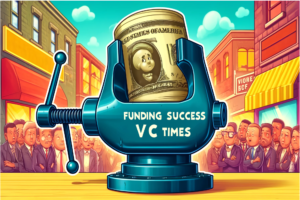The Point: At the Curation Agency, our Marketing Agency, we needed to address a complex Branding and Go-to-Market (GTM) strategy problem for a key client in the healthcare industry. The “Six Thinking Hats” technique by Edward de Bono is renowned for fostering comprehensive and collaborative problem-solving by encouraging participants to approach issues from multiple perspectives. The article shares how each hat—White, Red, Black, Yellow, Green, and Blue—was utilized to gather information, explore emotions, identify risks, consider benefits, foster creativity, and manage the thinking process. This highly-structured approach led to the development of a robust and innovative solution – all with ROI results, highlighting the effectiveness of the “Six Thinking Hats” in enhancing decision-making and fostering creativity in a team setting… Enjoy!
Harnessing de Bono’s “Six Thinking Hats” for a Breakthrough Branding Strategy
Edward de Bono’s “Six Thinking Hats” is a powerful technique that enables a group to approach a problem from multiple angles by donning metaphorical hats, each representing a distinct mode of thinking. The six hats are:
- White Hat: Focuses on information gathering.
- Red Hat: Emphasizes emotions and intuition.
- Black Hat: Examines caution and risks.
- Yellow Hat: Highlights optimism and feasibility.
- Green Hat: Encourages creativity and new ideas.
- Blue Hat: Manages the thinking process.
The “Six Thinking Hats”: A Structured Framework for Collaborative Problem-Solving
Developed by Edward de Bono, the “Six Thinking Hats” methodology is a structured tool designed to facilitate diverse thinking and collaborative problem-solving. By metaphorically donning different hats, each representing a distinct mode of thinking, this technique encourages participants to approach a problem from multiple angles, fostering a comprehensive exploration of the issue at hand and promoting innovative solutions.
Implementing the “Six Thinking Hats” in Our Strategy Session
We faced the challenge of revitalizing our client’s Brand and crafting a compelling Go-to-Market (GTM) strategy, we embraced the “Six Thinking Hats” approach, allowing it to guide our discussions and decision-making process. We started with the White Hat, purposefully gathering relevant information, including market research, consumer feedback, competitive analysis, and regulatory guidelines. This phase laid the groundwork for us by ensuring that we had a comprehensive understanding of the landscape where our client operated.
Next, we transitioned to the Red Hat, encouraging team members to express their intuitive feelings and emotional responses without the need for justification. This step was crucial for uncovering any underlying sentiments that could influence the strategy, capturing a range of emotional insights that might otherwise have been overlooked.
Critical Evaluation and Creative Exploration
With the Black Hat, we critically examined potential pitfalls and criticisms, identifying weaknesses in our initial ideas and considering worst-case scenarios. This critical evaluation helped us anticipate and prepare for potential challenges, ensuring (as much as we could) that our strategy was robust and resilient. Transitioning to the Yellow Hat, we focused on the positive aspects and feasibility of our ideas, highlighting the benefits of the different strategic approaches and assessing their practicality.
The Green Hat session was dedicated to fostering creativity and innovation, encouraging team members to think outside the box and explore novel possibilities. Through free thinking and idea generation, we uncovered several breakthrough concepts that had not been previously considered, broadening our strategic options and paving the way for truly distinctive solutions.
Structured Guidance and Breakthrough Outcomes
Throughout the process, the Blue Hat was worn by me – the session facilitator, ensuring our discussions remained focused, productive, and aligned with the structured thinking methodology. This role also involved me guiding the team through each hat wearing-phase, managing transitions, and summarizing key takeaways, maintaining a cohesive and efficient problem-solving environment.
The integration of Edward de Bono’s “Six Thinking Hats” technique proved invaluable in addressing our client’s Branding and GTM Strategy challenges. By systematically exploring each aspect of the problem through diverse colored hat-modes of thinking, we developed a well-rounded and innovative solution that resonated with our client’s objectives.
Key outcomes included a refreshed brand identity that fostered emotional connections with consumers while aligning with the company’s core values and positioning, a comprehensive risk management plan, creative and impactful marketing campaigns that stood out in the competitive healthcare landscape, and a practical and feasible implementation plan. But wait… There was more: Organizational alignment with mission, vision, and values can be achieved with financial results (Sorry, the inner-accountant in me couldn’t resist – This wasn’t a marketing initiative for marketing-sake, there’s actually a business case here with return on investment – ROI).
Summary
At our marketing agency, the Curation Agency, we remain committed to leveraging innovative techniques like Edward de Bono’s “Six Thinking Hats” to drive success for our clients across various industries, including the dynamic healthcare sector. By embracing structured problem-solving and creativity methodologies, we can unlock breakthrough branding and go-to-market strategies that propel businesses toward their goals, helping them stand out in crowded markets and resonate with their target audiences.
The “Six Thinking Hats” technique serves as a powerful tool in our arsenal, empowering us to approach complex challenges with a diverse array of perspectives and unlock creative solutions that truly make a difference. Through the systematic exploration of problems from various angles, we can develop well-rounded and innovative strategies that address our clients’ unique needs and objectives, fostering their growth and success in an ever-evolving business world.
Sam Palazzolo, Managing Director @ Tip of the Spear Ventures (Co-Founder & CMO @ Curation Agency)
KEY TAKEAWAYS
- Six Thinking Hats Technique: Edward de Bono’s methodology was used to tackle a complex branding and go-to-market strategy problem.
- Structured Thinking: The technique involves six different hats, each representing a unique thinking process: White (information gathering), Red (emotions), Black (risks), Yellow (benefits), Green (creativity), and Blue (process management).
- Comprehensive Approach: By addressing the problem from multiple angles, the team ensured a thorough exploration of the issue.
- Emotional Insights: The Red Hat phase allowed team members to express intuitive feelings and sentiments, uncovering underlying emotions that could influence the strategy.
- Risk Management: The Black Hat phase focused on identifying potential pitfalls and criticisms, preparing the team for possible challenges.
- Optimism and Feasibility: The Yellow Hat phase highlighted the positive aspects and practicality of different strategies.
- Creativity Boost: The Green Hat phase fostered innovative solutions and new ideas, broadening strategic options.
- Efficient Process Management: The Blue Hat phase ensured focused and productive discussions, guiding the team through each thinking phase.
- Innovative Solution: The structured approach led to a well-rounded and innovative branding and go-to-market strategy for the client.
- Enhanced Collaboration: The technique promoted inclusive and balanced discussions, strengthening team collaboration and decision-making capabilities.




